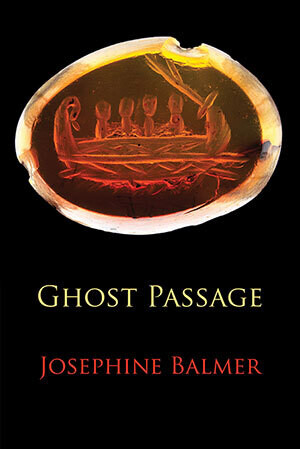Ghost Passage
Josephine Balmer
(Shearsman Books 2022; pbk, £10.95)
Most famously, Seamus Heaney remarked on ‘chiming the ancient with the modern’. In Ghost Passage, Josephine Balmer’s task is similarly charged. Her rich publication record includes her own poetry, Classical verse translations, editorship of anthologies and, arguably most closely in the context of this latest collection, Piecing Together the Fragments: translating Classical Verse, Creating Contemporary Poetry (OUP, 2013). This is a poet very ready to write this book.
Balmer’s collection is in three parts (‘In Wood’, ‘Through Clay’, and ‘On Stone’); it is arranged chronologically (in line with the archaeological finds on which each poem is based), and that the endnotes offer a statement on every one of the poems’ sources, make Ghost Passage appear at worst crumbly, and at best, of relevance only to the highly-specialised Classicist.
If so, that would be a shocking misreading. Just as Heaney’s North took prehistory’s truth as a keen blade to flense the contemporary, Ghost Passage is an accessible, layered joy of a book which repays considerable revisiting. Balmer’s response to archaeological fragments (dating from 54 BCE to the 20th C) casts an essential light on own times, as well as humanising pasts.
Very beautifully, the opening poem, ‘Writer[?], London’, is nigh-manifesto. That punctuation mark, like every other mark in this book, matters. Here’s to the poet’s fears ‘ the heart-knot terror/ of a letter misplaced, misconstrued.’
I learnt that we all stare through the cracks
of the Underworld.
(‘Thumbs Up’)
These lines, significantly taken from a grave containing eight clay lamps, now seems to be the grave of a female gladiator. Like many of the collection’s poems, our assumptions of these adversarial times are tested. Consider too ‘The swagger of swollen businessmen/ claiming their ownership of our coined streets’ in ‘Will’, and its challenge of the very meanings of that titular word. Read too that deftly sensitive examination of presumed binaries in ‘Both/Neither’ whose grave goods’ DNA revealed unexpected traces.
Then there are the learners seen from their incomplete alphabet tablets—those suffering under occupation, the shopkeepers, the gamblers, the slaves, the hopeless lovers and the thieves. A haunting series evokes what it might have been to be posted to ‘Britain/ that cursed place, ugly and remote?‘ (‘Catullus the Slave’), even to the Grampians, ‘the furthest/ any Roman had ever come’ where Agricola wrestles with himself and the loss of his son, in the elegiac ‘Too Far’:
I knew that this soil would never be cleansed.
Even in Hades, we would not see our sons again.
Something of the narrator’s magnanimity in the face of personal and wider tragedy recalls Kemal Atatürk’s speech at Gallipoli.
There is clear typographical homage throughout, honouring the source material, tracts, tablets and shards. The poet pushes this further in the layouts of ‘Cure-All’ and ‘Catullus’s Barrel’, both taken from stamps. Visually, these are highly satisfying—poems as a vibrant part of an ongoing dig.
While the visuals and the message, the shaping of the text delivers, Balmer never loses the narrator’s voice. Her attention to idiolect is one of the most significant achievements of these poems. Be it the General, or in the ‘fractured Latin but the way we spoke’ voiced by someone who knew that ‘faced with letters, he’d be bricking it’ that is inspired by graffito on a clay tile (‘Bricking It’), to the ‘The First European’ whose ‘bones still feed this earth’, these are honed, respected speakers.
The final sequence, ‘On Stone’ (‘Oxney sonnets’) moves closer to home, both chronologically and personally. There is real intimacy in the poet’s grace, chiming exactly as Heaney described.
Ghost Passage performs no surface pyrotechnics. It goes deep indeed. If you want to hear the voice of the migrant, the oppressed, the bereaved and the unsung, a voice from the past telling it for today with verve, witness, courage and even wit, you will find it here. Keep it close as you face ‘the pus-filled promise of charlatans’ charms’. (‘God Help Demetrios’)
Beth McDonough


Leave a Reply